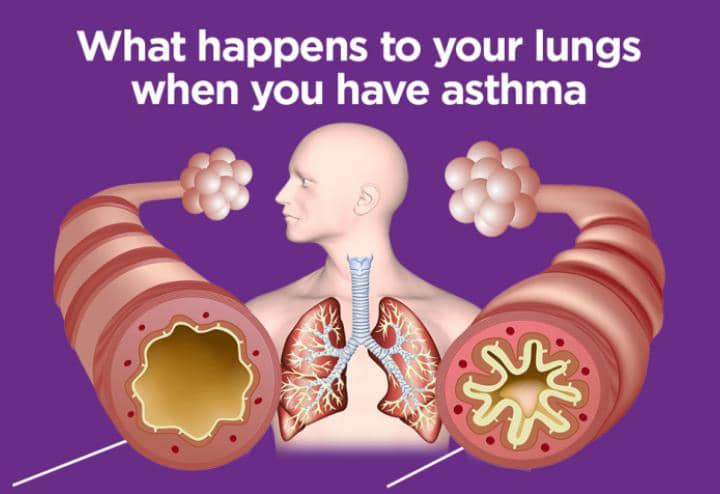Scientists in a recent study discovered a promising new pathway for asthma treatment, which they said offers hope for millions worldwide grappling with the chronic, life-threatening respiratory disease.
The new study seen as a significant stride toward combating asthma was carried out by scientists at King’s College, London, United Kingdom.
They suggested that the damage done by inflammation and mucus that result from an asthma attack could be prevented by blocking a process that normally causes the death of epithelial cells – which cover the inside and outside surfaces of the body.
The researchers revealed that the answer to stopping asthma symptoms may lie in cell extrusion, a process they discovered drives most epithelial cell death.
In the research published in the journal, Science, it was discovered that many features of an asthma attack such as inflammation, mucus secretion and damage to the airway barrier prevent infections resulting from mechanical constriction.
Asthma, characterised by inflammation and constriction of the airways, has long been a challenge to manage effectively.
Despite the disease being very common, the causes of asthma are still not understood.
While current medications treat the consequences of an asthma attack by opening the airways, calming inflammation, and breaking up the sticky mucus which clogs the airway, which helps control asthma, they do not prevent it.
According to the World Health Organisation, asthma is a major non-communicable disease, affecting both children and adults, and is the most common chronic disease among children.
The WHO noted that asthma affected an estimated 262 million people in 2019 and caused 455, 000 deaths.
The global health body revealed that asthma is often underdiagnosed and under-treated, particularly in low- and middle-income countries.
During the research, which lasted for ten years, the scientists at King’s College London used mouse lung models and human airway tissue to discover that when the airways contract, known as bronchoconstriction, the epithelial cells that line the airway get squeezed out to later die.
Because bronchoconstriction causes so many cell extrusions, it damages the airway barrier, which causes inflammation and excess mucus formation.
Meanwhile, previous research has found that the chemical compound gadolinium can block extrusion.
The researchers found that it can work in mice to prevent the excess extrusion that causes damage and inflammation after an asthma attack.
However, the compound has not been tested in humans and has not been deemed to be safe or efficacious.
The researchers suggested that their findings could underlie other inflammatory diseases that also feature constriction, such as cramping of the gut and inflammatory bowel disease.
Speaking further about the study, a Professor at King’s College London, who is also one of the authors, Jody Rosenblatt said, “Our discovery is the culmination of more than 10 years’ work.
“As cell biologists who watch processes, we can see that the physical constriction of an asthma attack causes widespread destruction of the airway barrier.
“Without this barrier, asthma sufferers are far more likely to get long-term inflammation, wound healing and infections that cause more attacks.
“By understanding this fundamental mechanism, we are now in a better position to prevent all these events.”
Explaining further about the study’s findings, Prof Rosenblatt added, “This constriction and destruction of the airways causes the post-attack inflammation and excess mucus secretion that makes it difficult for people with asthma to breathe.
“Current therapies do not prevent this destruction – an inhaler such as Albuterol opens the airways, which is critical to breathing, but, dishearteningly, we found it does not prevent the damage and the symptoms that follow an attack.
“Fortunately, we found that we can use an inexpensive compound, gadolinium, which is frequently used for MRI imaging, to stop the airway damage in mice models as well as the ensuing inflammation and mucus secretion.
“Preventing this damage could then prevent the build-up of musculature that cause future attacks.”
Reacting to the study, a pulmonologist at the Olabisi Onabanjo University Teaching Hospital, Dr Tope Oni told PUNCH Healthwise that the new study is a potential ‘game-changer’ in the treatment of asthma.
He said, “For decades, asthma treatment has focused on reducing inflammation, but this study shows that the constriction of airways is caused by a different mechanism.
“This discovery has the potential to transform the way we approach asthma treatment and could lead to the development of new drugs that prevent attacks and improve patients’ quality of life.”
The respiratory physician noted that the new treatment approach could be more effective than current treatments, which often fail to prevent attacks and can cause significant side effects.
“If we can prevent the destruction of the airway barrier, we could prevent the life-threatening features of asthma and improve patients’ long-term health outcomes,” he concluded.
Credit: Punch












Leave a Reply